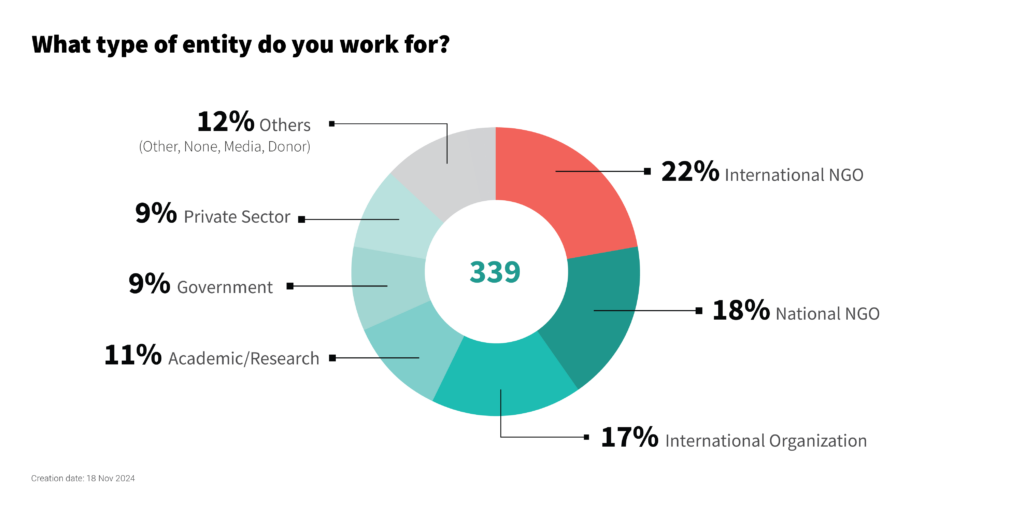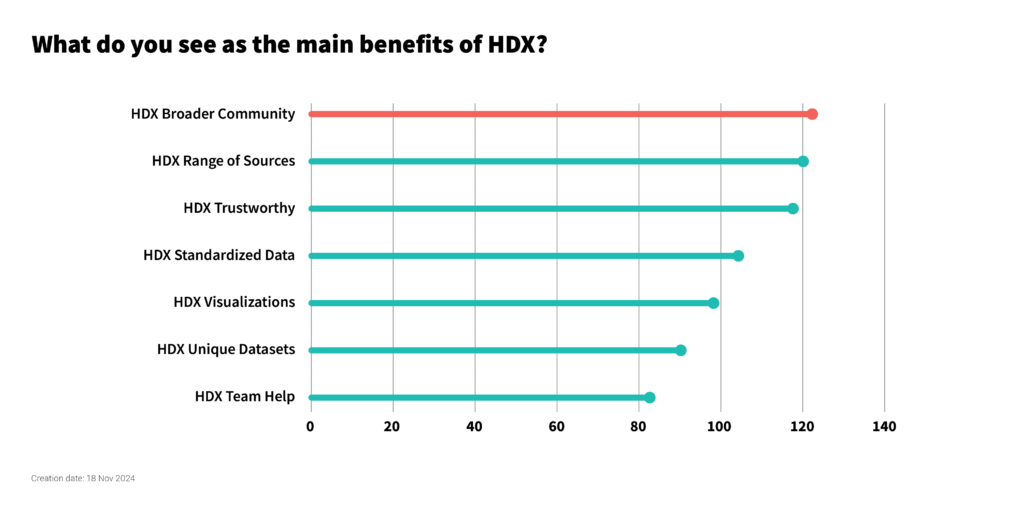Share
Earlier this year, we conducted a survey to gain insights into the needs and challenges faced by humanitarian data users. The questions covered the use of data broadly as well as the use of HDX specifically. The timing of the survey coincided with the ten year anniversary of HDX and builds on previous research to ensure our features and services are user-driven.
The survey ran from April to June 2024, gathering responses from 339 people. The locations with the highest number of respondents included Ethiopia, the Democratic Republic of the Congo, Kenya, the United States and Somalia. Over half of the respondents (53%) were based in Africa.
 Those responding worked for a variety of entities including international NGOs (22%), national NGOs (18%), international organizations (17%) as well as academia, government and the private sector (see breakdown below). The majority of respondents worked in entities with either a national (36%) or global reach (36%) with a smaller percentage working in entities with a regional (16%) or sub-national reach (8%).
Those responding worked for a variety of entities including international NGOs (22%), national NGOs (18%), international organizations (17%) as well as academia, government and the private sector (see breakdown below). The majority of respondents worked in entities with either a national (36%) or global reach (36%) with a smaller percentage working in entities with a regional (16%) or sub-national reach (8%).
 We categorized respondents into different roles based on their self-identified job titles. These roles include data expert (i.e., data scientist), data generalist (i.e., data manager), leadership (i.e., head of office) as well as non-data roles and unknown roles when a response was not provided.
We categorized respondents into different roles based on their self-identified job titles. These roles include data expert (i.e., data scientist), data generalist (i.e., data manager), leadership (i.e., head of office) as well as non-data roles and unknown roles when a response was not provided.
Regardless of the role, we found a similar pattern in the frequency of data use across these groups. For instance, while 59% of data experts and 48% of data generalists use data daily, leadership roles were not far behind, with 45% of them using data every day.
 We asked respondents about the challenges they face using data, with the option to select all that apply. The most frequently cited challenges were accessing data (138 respondents) and cleaning data (114 respondents). This suggests that even though platforms like HDX bring together thousands of relevant datasets, there is still critical data that is either unavailable or hard to find. For other challenges, like time for analysis, we are creating features that increase the speed to insight such as HDX Signals.
We asked respondents about the challenges they face using data, with the option to select all that apply. The most frequently cited challenges were accessing data (138 respondents) and cleaning data (114 respondents). This suggests that even though platforms like HDX bring together thousands of relevant datasets, there is still critical data that is either unavailable or hard to find. For other challenges, like time for analysis, we are creating features that increase the speed to insight such as HDX Signals.
 For those respondents that use HDX, we asked about the main benefits of the platform. The top responses were that HDX provides users with access to a broader data community, has a range of sources in one place, and is trustworthy. Through initiatives like our HDX dataset deep dives and our recent Humanitarian Data Forum, we have been working to strengthen the connections between our nearly 150,000 monthly users and the 200+ organizations that share data on HDX. We are also working on data standardization through initiatives like the HDX Humanitarian API.
For those respondents that use HDX, we asked about the main benefits of the platform. The top responses were that HDX provides users with access to a broader data community, has a range of sources in one place, and is trustworthy. Through initiatives like our HDX dataset deep dives and our recent Humanitarian Data Forum, we have been working to strengthen the connections between our nearly 150,000 monthly users and the 200+ organizations that share data on HDX. We are also working on data standardization through initiatives like the HDX Humanitarian API.
 If you participated in the survey, we appreciate your input and will keep you updated on the developments inspired by your feedback. If you would like to be involved in further user research for HDX, sign up to join our user research list.
If you participated in the survey, we appreciate your input and will keep you updated on the developments inspired by your feedback. If you would like to be involved in further user research for HDX, sign up to join our user research list.